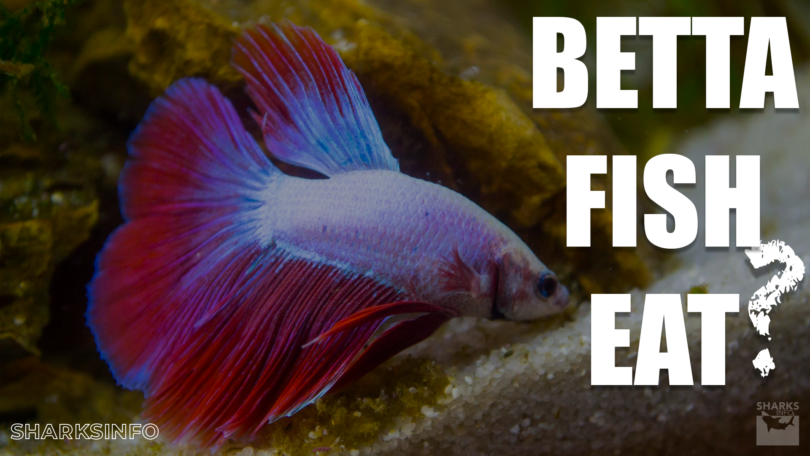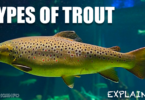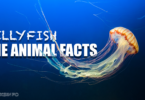Betta Fish also known as Siamese Fighting Fish is a famous and colorful aquarium fish. They are found in slow-moving streams, ponds, and Marshes. They are carnivorous and flourish well on live meat food such as worms, small insects, and other high-protein food. They require a strict diet plan. They feed on various frozen foods and special food pellets. It is necessary to feed them with balanced food, otherwise, they will have a shorter life in your aquarium.

In this detailed guide, we will cover the following outline.
- What Do Betta Fish Eat?
- Can Betta Fish Eat Human Food?
- Things to Remember While Feeding Betta Fish
- How Often to Feed Betta Fish?
- Reasons to Avoid Overfeeding
- What to Do If Betta Fish Stops Eating?
What Do Betta Fish Eat?
In the wild, they hunt insects, mosquitoes, and other small worms. In the tank, the pellets, flakes, and frozen food are the best nutrition for them. Below we have listed the tasty treats for your Betta Fish:
- Mosquito Larvae
- Earthworms
- Daphnia
- Live Brine-Shrimp
- Frozen Shrimp
- Bloodworms
- Betta Pellets and food flakes
1: Mosquito Larvae
The Staple food for the Betta in its natural habitat is Mosquito Larvae. They provide the Betta with all the nutrients they need. If you live in an area with a high number of mosquitoes, collect the larvae and store them in a jar for up to two weeks in the refrigerator. Try to add only a small amount each time and make sure your fish is finished before adding another.

2: Earthworms
The earthworms are a great source of protein for Betta Fish. You can collect the earthworms from the backyard of your house or buy some from the nearest store. Place the collected earthworms in the jar in the refrigerator and cut them into bite-sized pieces before feeding the fish.

3: Daphnia
Daphnia are small shrimps that live in small ponds and pools and feed on algae and organic matter. There are numerous types of Daphnia such as Daphnia Moina, Daphnia magna, and Daphnia pulex. They are considered the best fish food but might increase your fish’s risk of diseases. It is better to start your own culture of Daphnia to protect your fish from toxic substances and feed it a healthy diet.

4: Live Brine-Shrimp
Brine shrimps are required by Betta Fish as they are high in nutrients. You can treat your adult Betta with both adult and brine shrimp. Ensure they are free from insects before adding them to the tank. While adding them into the tank, spread them into the different corners. It will make your Betta active and is beneficial in case of constipation.

5: Frozen Shrimps
The Frozen shrimps are less costly, but they are best for your Betta Fish. They are easily available in the nearest store. Just add them to the tank as they are free from infectious diseases. These shrimps can be stored in the refrigerator for up to 6 months.

6: Bloodworms
Bloodworm is not an actual worm; it is the larvae of the fly species known as midge. They grow in shaded parts of water, in ponds and pools. Bloodworms are not as beneficial as shrimp. They provide high protein value, but they do not have other nutritional components.

7: Betta Pellets and Food Flakes
The Betta Fish do quite well with live or frozen food. However, you can feed them with Pellets or food flakes. The pellets can cause digestive problems to your Betta. If you are going to feed pellets to your Betta, you should look for good-quality pellets before feeding them. Soak the pellets in the water for 10 minutes before feeding the Betta Fish and add only the required amount as the pellets will sink into the tank.
The Betta Fish do not like flakes, try to feed them as a supplement with other food to provide the proper nutrition for your pet.

Can Betta Fish Eat Human Food?
Yes, on some occasions, you can feed your Betta with human food, but they cannot survive only on human food, they need extra nutrients to stay active. Human food must be the occasional supplement to your Betta and never be the permanent diet. You can give part of the pea to your Betta; Grab the pea, boil it, and chop it into smaller sizes. It will help in improving the digestive system of your Betta.
Things to Remember While Feeding Betta Fish
The following factors must be considered while feeding your fish:
1: Activity Level of Betta Fish
Some Betta Fish are slow, and they like to pass their time in a specific corner of the tank. On the other side, a few fish are extremely active, and they constantly move in the tank. The quantity of food depends on the activity of your fish; the more active your fish is, the more food it will need.
2: Size of Betta Fish
The second factor that must be considered while feeding your fish is its size. The bigger the fish is, the more food it needs. The king Betta Fish is generally larger than the regular Betta, so it requires more food.
3: Temperature of Tank
The ideal temperature for the tank of your Betta Fish is 76 to 82 degrees Fahrenheit. If the temperature of the tank is below the average temperature, it will slow down the metabolism rate of the fish. They cannot digest the food quickly and as a result, they will intake less food.
4: Size of Food
Another factor to be considered while feeding your Betta Fish is the size of the food. Fish food comes in different shapes, sizes, and densities. Feed the adequate amount to the fish depending on its requirement size.
How Often to Feed Betta Fish?
The Betta Fish will continue stuffing themselves as long as you keep giving them food. The Betta Fish are at high risk of overfeeding and bloating. The inconsistent schedule to feed the Betta Fish will leave them overfed, underfed, and unhappy. It is essential to feed your fish with a balanced diet. Keep the following tips in your mind while feeding your Betta Fish:
- Feed Betta Fish once a day to avoid overfeeding.
- Uneaten food should be removed immediately.
- Place the frozen food at room temperature before feeding.
- Feed the baby Bettas with smaller pallets and food.
- Feed food pellets 2 to 3 times a day. Feeding the Betta Fish once in the morning and once a day is best.
- 2 to 3 medium-sized pellets are enough in the morning and 2 to 3 medium size pellets in the evening.
Reasons to Avoid Overfeeding
The fish should have enough food so that its weight remains stable. The following are the reasons to avoid overfeeding your Betta Fish:
1: Bloating
The excess food eaten by Betta Fish might cause bloating. Overeating food will make them sick or die. The overfed fish will stop eating and might struggle to swim and maintain balance in the water.
2: Foul the Water
The excess food in the water will cause water quality problems. The food will decompose in water and result in a rise in ammonia levels. The small amount of high ammonia is dangerous for your fish.
3: Algae Blooms
The excess food present in the water will be broken down into nitrates. Nitrates are the food for algae. The algae will cause serious problems for Betta Fish by depleting the oxygen and depriving the nutrients from the aquarium.
What to Do If Betta Fish Stops Eating?
There can be several reasons why your betta fish is not eating including the stress in water, change in temperature, or environmental changes. The Betta Fish can live for 14 days without eating; so, if your Betta Fish stops eating, then there is no need to worry.
Conclusion
The colorful Betta Fish is the best addition to your aquarium. They require a strict diet plan and extra care. Figuring out what to feed them is quite complicated. The Betta Fish are carnivores and love to eat a high-protein diet. They eat shrimp, mosquito larvae, live and frozen shrimps, bloodworms, and pellets.
As opposed to pellets they will do best with live or frozen food. The shrimp are their favorite food, and you must supply them twice or thrice a week. Feed your fish only the recommended amount as overfeeding will lead to constipation and bloating. Clean out the excess food from the water using the turkey baster.







